
A program helping communities lead their own climate resilience journey, with expert tools and support.
Small and mid-sized communities are on the frontlines of the climate crisis, but often lack the budget or bandwidth to take action. That is why we created Climate Ready Communities. It is a proven resource to help local leaders cut climate pollution and adapt to a changing climate.
Based on over 15 years of hands-on work with communities through our ClimateWise initiative, Climate Ready Communities provides a step-by-step roadmap for developing climate resilience plans that reflect local needs, values, and realities. Centered around a free guidebook, this program helps communities understand their climate vulnerabilities and sources of greenhouse gas emissions, develop strategies, and create an actionable climate resilience plan.
Climate Ready Communities supports both adaptation and mitigation planning within the framework of climate resilience, so your community can act on climate from every angle.
What is the Climate Ready Communities program?
Whether you are just starting out or looking to refresh your climate strategies, the Climate Ready Communities program is a powerful resource.
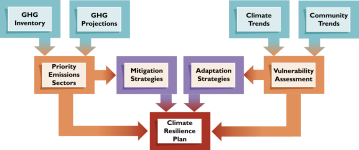
A proven framework to assess risks, identify emission sources, develop strategies, and build a climate resilience plan

Real-world-tested planning strategies and tips in the Practical Guide to Building Climate Resilience
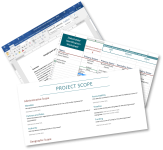
Templates and tutorials to make it easier
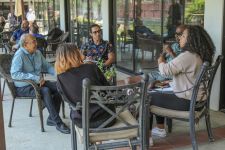
A cohort process that provides personalized, expert support

Guidance that works for small, rural, and under-resourced communities
“I was one of the original reviewers for this program, and was impressed by the breadth and detail of the information provided in the Practical Guide for Developing Climate Resilience. The Geos Institute’s framework for developing climate resilience provides a systems approach that a community can actually use and the Guide covers a range of useful topics from community engagement to developing a task force. The tutorials, templates and website will help a community like ours navigate the resilience building process.”
Dena Winslow, tribal planner and grant writer, Aroostook Band of MicMacs, Presque Isle, ME
“Climate Ready Communities has given the City of Warren the means and resources necessary to begin meaningful dialogues about climate change, mitigation, and adaptation in a way that leads to community-driven actions that can be implemented by way of local and county governments through actions organized by steering committees.”
City of Warren, MN
“The Climate Ready Communities program has been extremely relevant and useful for Sierra CAMP as a regional collaborative. The comprehensive guide with its step-by-step organization helps us and our member communities break the climate resilience planning process into manageable steps and build our internal technical expertise. We’ve found the Annual Support service to be valuable for our Peer Group in demonstrating specific adaptation case studies, and we’ve had a chance to utilize the consulting hours to conceptualize and plan key regional initiatives like the regional vulnerability assessment.”
Nikki Caravelli, Sierra CAMP Project Manager, Sierra Business Council
“We find these tools to be effective and designed with a community user’s perspective in mind. We appreciate the step-by-step approach as well as the fact that the program is flexible, allowing us to make modifications as needed to fit our specific circumstances.”
Diana Maneta, Missoula County’s Energy Conservation and Sustainability Coordinator
“The Climate Ready Communities program has been an excellent tool for Corinth. It provides clear steps and expert guidance. The backing of the Geos Institute provides credibility and helps to build momentum for our resilience planning. Our participation in Climate Ready Communities has put us much further along in the climate resilience planning process than I believe we otherwise would be.”
Patrick Hubbard, Development Coordinator for the City of Corinth, TX
A Guide Born from Community Demand
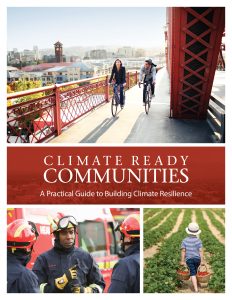 Climate Ready Communities started with a question: Can you help us? Local leaders across the country were ready to take action on climate, but did not have the skills or funding to get started.
Climate Ready Communities started with a question: Can you help us? Local leaders across the country were ready to take action on climate, but did not have the skills or funding to get started.
At the time, there was no off-the-shelf solution, so we created one. Drawing on our years of one-on-one support through the ClimateWise initiative, we packaged everything we knew into the comprehensive Practical Guide to Building Climate Resilience and offered it free of charge to anyone who needed it. Since 2019, it has been downloaded over 2,000 times.
We also heard loud and clear that communities were no longer separating climate adaptation work from their efforts to cut climate pollution, and they needed the program to include both. So, in 2025 we partnered with the Great Plains Institute to expand the program to support comprehensive climate resilience planning that includes both adaptation and mitigation. The latest edition of our Practical Guide to Building Climate Resilience integrates all we have learned since releasing the first edition in 2019.
We are currently updating the Practical Guide to Building Climate Resilience to include integrated mitigation strategies, building on the same trusted framework communities have relied on since 2019.
A Support Model to Meet Community Realities
In 2023, we partnered with the Environmental Resilience Institute at Indiana University to pilot a cohort model of communities working through the guide together. This effort helped us understand how to streamline the experience, refine the materials, and support success through a structured group model.
For communities that want this type of additional support, Climate Ready Communities now includes a cohort process led by an expert facilitator. Participating communities work through the planning steps together, learning with and from each other as they move their communities toward their climate resilience goals. In addition to the guidebook, cohort members also have access to templates, tutorials, and expert facilitation from our team.
The Quick Start Process
While anyone can use the Climate Ready Communities guide on their own or by participating in a cohort, we know some communities need to take immediate action, even before they have a full climate resilience plan.
The Quick Start Process is a model designed specifically for under-resourced communities that have the support of a Navigator and are ready to roll up their sleeves and get to work. This facilitated quick start process focuses on identifying and prioritizing climate resilience actions that are already approved in existing plans as the first step.
Through this process, cohort members:
- Understand more clearly their climate risks and emissions sources
- Identify existing climate-related strategies already embedded in local plans
- Prioritize the implementation of existing strategies
- Identify any gaps and develop new strategies
- Create a practical, actionable climate resilience plan
This model builds momentum quickly, identifying existing strategies buried in local documents, clarifying gaps, and outlining actionable next steps. It is designed for communities just starting out with a Navigator in our Climate Ready America initiative.
Want to learn more?
Are you are just getting started or wondering how to get started building climate resilience in your community? You’re not alone. Explore the Climate Ready Communities program to see if it is right for you.
Ready to Get Started?
If your community is ready to take the next step and you want to explore whether a cohort is forming in your area, we would love to hear from you.

 Robert Macnee, Ph.D. is Deputy Director of Resilience Services at Climate Resilience Consulting, where he helps governments, institutions, and communities reduce climate risk in equitable and practical ways. He holds a Ph.D. in Environmental Management focused on climate change impacts on health and communities, and brings over a decade of experience spanning economic development, resilience planning, and implementation.
Robert Macnee, Ph.D. is Deputy Director of Resilience Services at Climate Resilience Consulting, where he helps governments, institutions, and communities reduce climate risk in equitable and practical ways. He holds a Ph.D. in Environmental Management focused on climate change impacts on health and communities, and brings over a decade of experience spanning economic development, resilience planning, and implementation.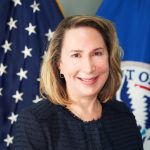 Samantha Medlock is President of Climate Risk Advisors, helping communities and organizations advance equity, sustainability, and resilience. Her career began chasing floods as a local official in Texas Flash Flood Alley—a hands-on experience that still shapes her approach to climate and disaster risk management.
Samantha Medlock is President of Climate Risk Advisors, helping communities and organizations advance equity, sustainability, and resilience. Her career began chasing floods as a local official in Texas Flash Flood Alley—a hands-on experience that still shapes her approach to climate and disaster risk management.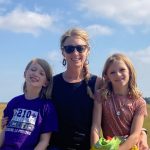
 Jim is a multilingual world traveler. Based in Bavaria during the 1970s, Jim spent most of this period in India, Afghanistan and Nepal, where he founded and operated a charitable medical clinic serving Tibetan Refugees. He settled in Oregon in 1983 on a forested ranch in the Umpqua National Forest.
Jim is a multilingual world traveler. Based in Bavaria during the 1970s, Jim spent most of this period in India, Afghanistan and Nepal, where he founded and operated a charitable medical clinic serving Tibetan Refugees. He settled in Oregon in 1983 on a forested ranch in the Umpqua National Forest. Dr. Micah Hahn is an Associate Professor of Environmental Health in the Institute for Circumpolar Health Studies at the University of Alaska-Anchorage. She received her joint PhD in Epidemiology / Environment and Resources from the University of Wisconsin-Madison and her MPH in Global Environmental Health from Emory University. Subsequently, she was a postdoctoral fellow for the CDC Climate and Health Program, and in this position worked collaboratively with the CDC Division of Vector-borne Diseases and the National Center for Atmospheric Research. Her research focuses on understanding the health impacts of climate change and working with communities to develop locally-relevant adaptation and resilience-building strategies. Dr. Hahn is also on the Management Team of the Alaska Climate Adaptation Science Center.
Dr. Micah Hahn is an Associate Professor of Environmental Health in the Institute for Circumpolar Health Studies at the University of Alaska-Anchorage. She received her joint PhD in Epidemiology / Environment and Resources from the University of Wisconsin-Madison and her MPH in Global Environmental Health from Emory University. Subsequently, she was a postdoctoral fellow for the CDC Climate and Health Program, and in this position worked collaboratively with the CDC Division of Vector-borne Diseases and the National Center for Atmospheric Research. Her research focuses on understanding the health impacts of climate change and working with communities to develop locally-relevant adaptation and resilience-building strategies. Dr. Hahn is also on the Management Team of the Alaska Climate Adaptation Science Center. Michael is a former Founding Principal of Resilient Cities Catalyst, a global non-profit helping cities and their partners tackle their toughest challenges. He is currently the Executive Director of Climate Resilience Academy at the University of Miami.
Michael is a former Founding Principal of Resilient Cities Catalyst, a global non-profit helping cities and their partners tackle their toughest challenges. He is currently the Executive Director of Climate Resilience Academy at the University of Miami. Dr. Quintus Jett is a consultant, educator, and strategist for public causes. He has a doctorate in Organizations & Management from Stanford University, and a two-decade faculty career which spans schools, departments, and programs of business, engineering, liberal studies, divinity, and public and nonprofit management. Following Hurricane Katrina in 2005, Dr. Jett launched a volunteer project in New Orleans, which enlisted residents, students from over a dozen colleges and universities, and hundreds of others to field map the city’s Gentilly district, Lower Ninth Ward, and New Orleans East. Dr. Jett is an innovator in higher education, bridging the divide between academic research and the other priorities of the modern university, including student access and diversity, community engagement, and providing foundations for life-long learning in today’s rapidly changing world.
Dr. Quintus Jett is a consultant, educator, and strategist for public causes. He has a doctorate in Organizations & Management from Stanford University, and a two-decade faculty career which spans schools, departments, and programs of business, engineering, liberal studies, divinity, and public and nonprofit management. Following Hurricane Katrina in 2005, Dr. Jett launched a volunteer project in New Orleans, which enlisted residents, students from over a dozen colleges and universities, and hundreds of others to field map the city’s Gentilly district, Lower Ninth Ward, and New Orleans East. Dr. Jett is an innovator in higher education, bridging the divide between academic research and the other priorities of the modern university, including student access and diversity, community engagement, and providing foundations for life-long learning in today’s rapidly changing world. Scott is Monfort Professor of Atmospheric Science at Colorado State University. He has written about 100 publications in the peer-reviewed climate literature, is a former editor of the Journal of Climate, and served for five years as founding Science Chair of the North American Carbon Program.
Scott is Monfort Professor of Atmospheric Science at Colorado State University. He has written about 100 publications in the peer-reviewed climate literature, is a former editor of the Journal of Climate, and served for five years as founding Science Chair of the North American Carbon Program. Linda has many years of experience in disaster preparedness and resilience. She has been an elected official on the Linn County Iowa Board of Supervisors, Chair of the Metropolitan Planning Organization, the East Central Iowa Council of Governments, the statewide Mental Health Developmental Disability and the Linn County Board of Health. Langston is a former president of the National Association of Counties (2013-2014).
Linda has many years of experience in disaster preparedness and resilience. She has been an elected official on the Linn County Iowa Board of Supervisors, Chair of the Metropolitan Planning Organization, the East Central Iowa Council of Governments, the statewide Mental Health Developmental Disability and the Linn County Board of Health. Langston is a former president of the National Association of Counties (2013-2014). Ken works with families and organizations as a mediator, organizational consultant, trainer and facilitator. Along with his passion for helping people prepare for and reduce climate change, Ken also volunteers as a mediator through Mediation Works and is passionate about supporting youth through mentoring with Boys to Men of Southern Oregon.
Ken works with families and organizations as a mediator, organizational consultant, trainer and facilitator. Along with his passion for helping people prepare for and reduce climate change, Ken also volunteers as a mediator through Mediation Works and is passionate about supporting youth through mentoring with Boys to Men of Southern Oregon. Matthew is a retired high school teacher who was once honored as Oregon High School Social Studies Teacher of the Year. Before his teaching career he was in the restaurant business in Portland. He is also a lawyer who has been a member of the Oregon State Bar Association since 1980.
Matthew is a retired high school teacher who was once honored as Oregon High School Social Studies Teacher of the Year. Before his teaching career he was in the restaurant business in Portland. He is also a lawyer who has been a member of the Oregon State Bar Association since 1980. Andrea is the Resilience Policy Advisor for the North Carolina Office of Recovery and Resiliency. She works across state agencies and with local governments to increase the state’s resilience to the impacts of climate change.
Andrea is the Resilience Policy Advisor for the North Carolina Office of Recovery and Resiliency. She works across state agencies and with local governments to increase the state’s resilience to the impacts of climate change.